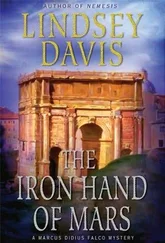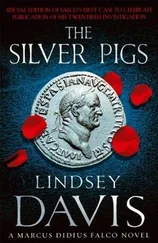Lindsey Davis - The Ides of April
Здесь есть возможность читать онлайн «Lindsey Davis - The Ides of April» весь текст электронной книги совершенно бесплатно (целиком полную версию без сокращений). В некоторых случаях можно слушать аудио, скачать через торрент в формате fb2 и присутствует краткое содержание. Год выпуска: 2013, ISBN: 2013, Издательство: Minotaur Books, Жанр: Исторический детектив, на английском языке. Описание произведения, (предисловие) а так же отзывы посетителей доступны на портале библиотеки ЛибКат.
- Название:The Ides of April
- Автор:
- Издательство:Minotaur Books
- Жанр:
- Год:2013
- ISBN:9781250023698
- Рейтинг книги:3 / 5. Голосов: 1
-
Избранное:Добавить в избранное
- Отзывы:
-
Ваша оценка:
- 60
- 1
- 2
- 3
- 4
- 5
The Ides of April: краткое содержание, описание и аннотация
Предлагаем к чтению аннотацию, описание, краткое содержание или предисловие (зависит от того, что написал сам автор книги «The Ides of April»). Если вы не нашли необходимую информацию о книге — напишите в комментариях, мы постараемся отыскать её.
The Ides of April — читать онлайн бесплатно полную книгу (весь текст) целиком
Ниже представлен текст книги, разбитый по страницам. Система сохранения места последней прочитанной страницы, позволяет с удобством читать онлайн бесплатно книгу «The Ides of April», без необходимости каждый раз заново искать на чём Вы остановились. Поставьте закладку, и сможете в любой момент перейти на страницу, на которой закончили чтение.
Интервал:
Закладка:
"Were these people all women?" I asked, pushing him.
"No, all sorts. Just a few more sudden deaths than usual- possibly. I haven't been counting. Don't ask me for names."
"Any rumours?" I wondered. The public can be good at picking up illegal activity.
The funeral director gave me a swift glance. He did not look nervous or hunted. He did not brush me aside like a silly young thing. Instead, he appeared to consider my question fairly and to honestly say no, there were not. If he was hushing up a scandal, he was good. I had to believe him.
I was to develop more doubts about Metellus Nepos. In a quiet moment while he waited to do his duty gathering the ashes into a ceramic urn, he approached and thanked me for coming. I took the opportunity to mention that I knew he had visited the aedile. He confirmed that he went to say he was paying compensation for the child's death, and make it plain that the family were satisfied with what he offered them. He made no mention of the wall poster; Nepos seemed too decent to demand its removal, or even to think of doing so.
Nepos volunteered that he told the magistrate about his suspicions regarding his stepmother's death. He had discussed hiring me. (I wished my friend the archivist had thought to warn me about this.) "I discussed with Faustus all the aspects you had checked so carefully, Albia, and admitted that you found no evidence." Nepos seemed concerned that I might be annoyed. Certainly, if the case had been live, I would have wanted any client to consult me before he involved the authorities. "The aedile is not the same as the vigiles, but he does have responsibility for aspects of law and order. It seemed right to let him know my concerns."
I reassured him. "That is perfectly reasonable. I would not have stopped you … So what did you think of him? According to my contacts, Manlius Faustus sounds-let's say, unsympathetic."
Nepos stared at me for a moment, seeming surprised. "No, I found him very straightforward. He doesn't say much, but he listens. A good, intelligent choice for the job."
"That's rare."
"Exactly!" replied Nepos. He sounded annoyed, as if I had insulted a friend of his.
I did not let this alter the picture of the aedile I had previously from Andronicus. Plenty of men behave quite differently with a onetime business visitor from how they treat members of their household. In that case, how they are at home tends to be their true character. Manlius Faustus must have social skills; he needed votes to win election to his office. In short, he must know how to schmooze. It was quite possible for him to act polite to Nepos two nights ago, and yet be a pernicious swine to his own slaves and freedmen on a daily basis.
"And did he react to your unease about Salvidia's death?"
Nepos was gazing at the spitting flames. "Not specifically."
"I presume he is not intending any follow-up action?"
Nepos spoke a little abstractedly. "No. No, he won't be doing that."
Like the undertaker, Nepos made it casual and seemingly sincere. But his acting was less good. He was a cheesemaker and seller. He did not spend his professional life putting on a show of false emotion, as any funeral director has to. Nepos seemed so honest that if a piece of cheese had a spot of mould, he would point it out and advise you to slice off the worst before you served it. So in his case, I saw through him: as he tried to deflect me, a curtain came down. More had been discussed with Faustus than he was prepared to tell. He was blotting out a topic he did not want to discuss with me.
Something was going on. Something that was being kept from the public in general and me in particular.
X
The death squads were out that evening.
When I first came to Rome it was the reign of the Emperor Vespasian, tough but decent. My parents knew him. They knew his elder son Titus as well, but Titus only survived his father by a couple of years, years that were dominated by the disastrous volcanic eruption of Mount Vesuvius. Even in that dark moment, Rome was well-run and thriving. But when Titus died unexpectedly, rumours that he had been poisoned by his jealous brother Domitian indicated just what kind of rule would follow. Eight years later, we were used to suspicion and fear. Praetorian Guards were regularly sent out to search for those whose low opinion of their emperor had aroused his loathing for them.
Failure to flatter that podgy despot Domitian was a deadly mistake. Many people inadvertently made the error; the slightest thing could offend him. So, as I returned wearily to the city from the necropolis, I was not surprised to glimpse a small group of soldiers passing the end of a dark street; there was no doubt of their sinister intent. As they tramped into the neighbourhood, everyone disappeared from the streets. Even a cat fled, yowling. It realised the soldiers were pitiless men who, if it strayed within their reach, would grab its tail and dash its brains out.
The night was dark by then, moonless and starless, though almost too early for the imperial guards to arrive. Normally, they liked to surprise victims with sudden and thunderous knocking at the door while everyone was sleeping. Just before dawn, a bleary porter would find set-faced men with drawn swords, bringing punishment, often for a crime the victim had not even known he had committed. If the soldiers turned up during hours of darkness, there was less chance of resistance; less chance, too, of angry neighbours raising a public outcry. Tyrants are petrified of riots. Come the pale light of morning, word of a new death in the upper classes would infiltrate basilicas and emporia, though such brutal deletions of humanity were never formally listed in the Daily Gazette.
That night the first warning of their presence was their torches. Guards always carried rather good torches, and plenty of them. Trained killers need big, long-lasting flames; only the very best tar for Domitian's punishers. These heavyweights are crack troops; they don't want to march out on a mission to murder some measly senator only to be jumped by one of the petty muggers who hang about at night. It would be just too, too shameful to creep back to the Praetorian Camp and have to admit that they had been held up and had their medals and fancy daggers stolen by one of the moth-eaten larcenists on Chickenbone Alley.
We were used to the execution squads. That was the worst part; we now accepted it. Children were growing up in Rome who had never known an ordinary, safe existence. Even adults who remembered better times rarely questioned the way things were.
For someone like me, who worked among deceivers and double-crossers, the new atmosphere of dread was an appropriate backdrop. We had reached a grim period when Domitian was clearly becoming more cruel. He believed his wife had betrayed him with an actor; his foreign wars were derided; he had just survived a rebellion in Germany headed by a man he trusted; and his beloved niece Julia had died. He took it out on us, his helpless subjects. Probably he had realised that, much as he wanted to be adored, nobody liked him. The more he executed people who showed their hostility, and the feebler his excuses, the less our charmless tyrant would be loved… Neither he nor we could escape the cycle of misery.
Constant executions had affected the public. Political uncertainty led to desperation. People lost their morality-where they had had any in the first place. A cynic would say it gave more work for informers-the emperor, for one, certainly used spies, spies at all levels of society, spies who were good, bad or absolutely indifferent these days to the faint concept of honesty that had once existed in some of us. As well as the emperor himself wanting to destroy the personal enemies he saw behind every palace pillar, informers could find plenty of ordinary people who were ready to betray others. Picking a fight with your neighbour over a boundary dispute or insulting a shopkeeper who served rotten leeks were now dangerous exploits. You could end up in court, with some unscrupulous informant-turned-prosecutor accusing you of treason or that wonderfully nebulous concept, "atheism"-all with sworn statements to "prove" the crime that had in fact never happened.
Читать дальшеИнтервал:
Закладка:
Похожие книги на «The Ides of April»
Представляем Вашему вниманию похожие книги на «The Ides of April» списком для выбора. Мы отобрали схожую по названию и смыслу литературу в надежде предоставить читателям больше вариантов отыскать новые, интересные, ещё непрочитанные произведения.
Обсуждение, отзывы о книге «The Ides of April» и просто собственные мнения читателей. Оставьте ваши комментарии, напишите, что Вы думаете о произведении, его смысле или главных героях. Укажите что конкретно понравилось, а что нет, и почему Вы так считаете.












